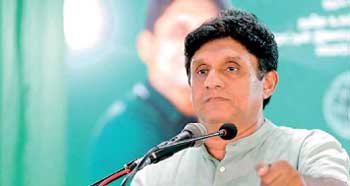Sunday Feb 22, 2026
Sunday Feb 22, 2026
Saturday, 7 December 2024 00:34 - - {{hitsCtrl.values.hits}}
 |
| Opposition leader Sajith Premadasa |
Opposition leader Sajith Premadasa yesterday slammed the Government, which secured a massive mandate, of betraying the people’s trust by entering into an agreement with the International Monetary Fund (IMF).
He made these remarks in Parliament yesterday as Premadasa voiced his concerns over the Government’s handling of the IMF agreement, describing the move as one of the greatest betrayals in recent times.
Premadasa called for the Parliament to be convened before 12 December, as initially proposed by the Government, to present the IMF agreement to the legislative body for discussion.
He also said that the Opposition is prepared to cooperate during the debate, provided the focus is on securing better terms for the country.
Citing Ghana as an example, he stressed the importance of bipartisan efforts to negotiate a more favourable agreement and urged the Government to present the full details of the IMF arrangement to Parliament before its implementation.
He warned that the current agreement, if enacted, could plunge the country into a debt trap for decades.
Premadasa highlighted a contradiction between the Government’s actions and the vision outlined in its election manifesto, “Prosperous Country and a Beautiful Life,” which proposed alternative methods for sustainable debt management in partnership with the IMF.
He questioned whether the existing agreement aligns with these principles or merely follows the policies established under former President Ranil Wickremesinghe’s Government.
Peramdasa warned that pursuing the current IMF agreement could derail the path to achieving the promised prosperity and better living standards, effectively collapsing the country’s future prospects.
He also pointed out that in the IMF’s March 2023 report, debt repayment was slated to begin in 2033. However, under the new agreement, repayment was expedited to 2028, placing the country under greater financial strain. He criticised the Government for hastily accepting IMF terms without thorough review, prioritising access to extensive debt facilities over long-term economic stability. He urged the Government to renegotiate the agreement to better safeguard the country’s interests.
Drawing attention to Ghana’s success in debt reduction, Premadasa highlighted how Ghana negotiated a 37% reduction in debt and secured a 6% interest rate with the IMF. In contrast, Sri Lanka, under the current agreement, faces significantly worse terms. He noted that based on an average GDP of $107 billion between 2025 and 2028, Sri Lanka will need to pay an additional $ 2.3 billion in debt compared to its previous commitments.
He also warned that interest rates could escalate from 6.8% in 2028 to 9.65% by 2032.
Premadasa argued that Sri Lanka, like Ghana, could achieve better terms by rejecting unfavourable proposals and pursuing more strategic negotiations. However, under the current circumstances, the government has failed to secure meaningful debt reductions.
Premadasa expressed concerns about the growing debt burden and its impact on vulnerable groups. He warned that prioritising excessive debt repayment would lead to decreased investments in essential sectors like education, healthcare, agriculture, and fisheries.
He reiterated his willingness to offer practical solutions to address these challenges and called on the Government to adopt a more inclusive and sustainable approach.
Premadasa also criticised the Government for embracing neoliberal economic policies under President Ranil Wickremesinghe’s leadership, which he argued exacerbate inequality and social challenges.
He called for a middle path between extreme capitalism and socialism, advocating for a model of “humanitarian capitalism.”
He referenced the Opposition’s previous stance against domestic debt restructuring as an example of protecting national interests and called on all parties to unite in safeguarding the country’s future.
Additionally, Premadasa requested an extension of the temporary suspension of the Parate law, which is set to expire on 15 December, and urged the Government to implement a systematic program to address these concerns.